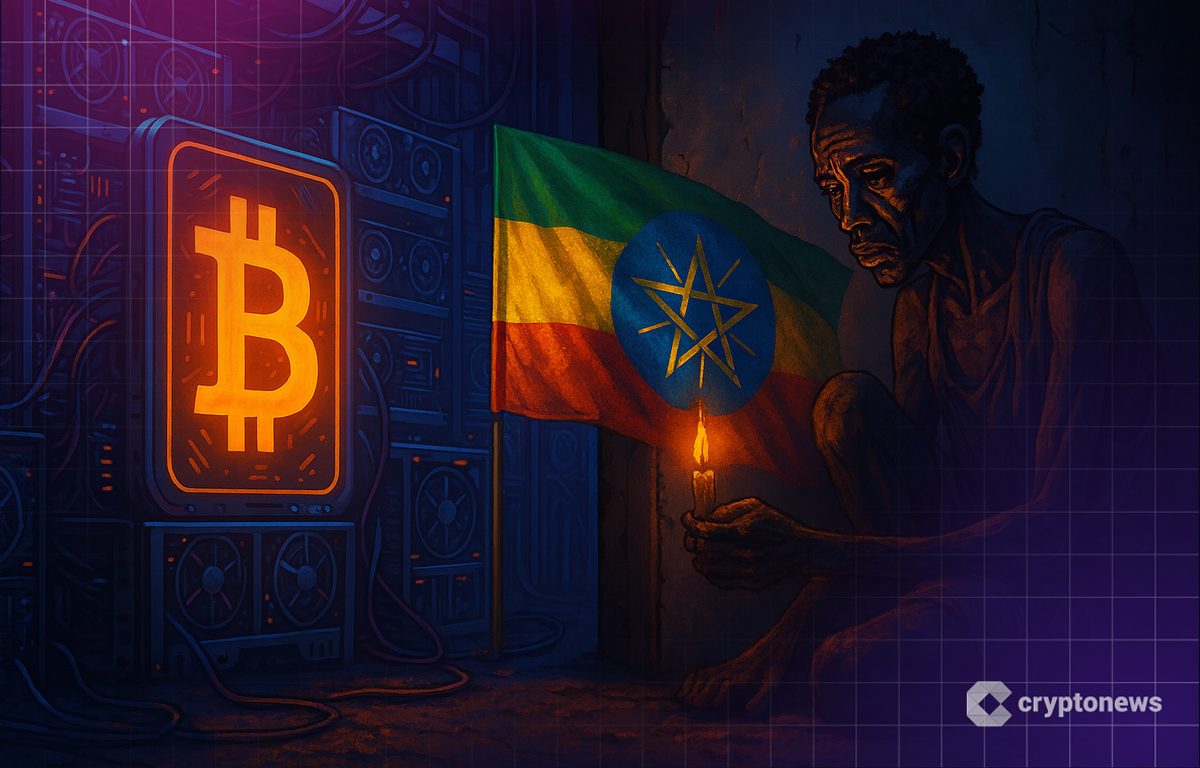As Bitcoin Mining Grows, 57 Million Ethiopians Remain in the Dark

Key Takeaways:
Ethiopia has stopped issuing new electricity supply permits to Bitcoin mining firms because it cannot meet demand. It comes as 57 million Ethiopians still lack access to electricity, raising concerns over national priorities. Ethiopia’s state power company reported $220 million in Bitcoin mining revenue over the past year.Ethiopia has stopped issuing new electricity supply permits to Bitcoin mining companies because it can no longer meet new demand, according to Ashebir Balcha, CEO of state power utility Ethiopian Electric Power (EEP).
It comes amid concerns that the Ethiopian government is prioritizing profit over the welfare of its citizens. Fifty-seven million people — almost half the population — still live without electricity due to a lack of transmission infrastructure.
Meanwhile, Ethiopia has dedicated 600 megawatts (MW) of electricity to Bitcoin mining — about 11% of the country’s current generating capacity of 5,631 MW, per the EEP website. It’s enough energy to power half of Addis Ababa, the Ethiopian capital city, according to a new BBC Africa report.
“From our current assessment, access appears to be at capacity,” Balcha said, as reported by Ethiopian news outlet Shega. He was speaking during the EEP’s annual performance review held in Addis Ababa last week.
Ethiopia’s Bitcoin Mining Boom
Bitcoin mining is booming in Ethiopia, the second most populous nation in Africa after Nigeria. Since 2023, around 27 companies have been licensed to mine Bitcoin in Ethiopia, according to a report by crypto firm Bitcoin Birr.
Nearly 20 more foreign companies are currently on a waiting list. Miners are drawn to Ethiopia’s cheap hydroelectric power, produced mainly from the Grand Ethiopian Renaissance Dam (GERD), one of Africa’s largest power projects.
The report says miners pay $3.60 per kilowatt hour (kWh) of electricity after tax, making the cost of electricity for miners in the East African country significantly lower than the average in other markets.
On average, each Bitcoin mining machine based in Ethiopia generates a profit of $5.71 a day, making it a lucrative business. Some miners have installed as many as 50,000 Bitcoin miners at their facilities.
Kal Massa, founder of Bitcoin Birr, says Ethiopia now accounts for 5% of Bitcoin’s total computing power, or hashrate, up from about 2.5% in January. Increasing hashrate suggests miners are bullish about making profits.
For Ethiopian Electric Power, the decision to sell electricity to Bitcoin miners has been equally profitable. The state-run power utility reportedly generated more than $200 million in revenue from mining in 2025 alone.
Some analysts initially disputed the revenue figures. “This was an early estimate,” Massa told Cryptonews. “The real number is $25 to $28 million a month being made by EEP from Bitcoin miners (sic).”
Posting on X, Bitcoin mining analyst Daniel Batten said EEP needed an average of 1.2 gigawatts mining at any one time between Jan-June 2025 to achieve those revenues at $31-35 per megawatt hour (MWh).
“Considering there was only 600MW in Oct 2024, that [$200 million revenue] seems on the high side,” he said.
However, latest figures from Ethiopian Electric Power show that the utility earned $338 million in revenue from the sale of electricity to neighboring countries and Bitcoin miners. The revenue is for the 2024/2025 fiscal year.
Around 35%, or $118 million, of the total amount came from power exports to Djibouti, Kenya, and Sudan, the Ethiopian Press Agency reports. The remainder, $220 million, came from data mining, including crypto mining.
Ethiopian regulations classify Bitcoin mining under data mining.
Social Dilemma as Millions Lack Electricity
Ethiopia plans to add 5,000 MW of electricity to the national grid from its GERD project over the next few months. The country is aiming to grow its revenue from regional exports and Bitcoin mining to $427 million by 2026.
It means that the suspension on issuing power purchase agreements for miners will likely be lifted as well.
Critics question the wisdom of dedicating a chunk of Ethiopia’s limited energy to mining for short-term gain while millions still lack access to basic electricity services.
Over 45% of Ethiopia’s population, estimated at 120 million, live without power, and even in major cities, blackouts are frequent.
“I think the issue of Bitcoin Mining is of concern,” David Gitonga, founder of Kenya-based crypto platform BitKE, told CNBC Africa.
“It’s a report from the government of Ethiopia that actually raised this concern because… a large part of the population, 50%, still do not have access to electricity,” Gitonga said, adding:
“The real concern is about priorities: should [Ethiopia] be mining Bitcoin and making $400 million every year, or should we be prioritizing giving citizens electricity? There needs to be a balance [between the two].”
Gitonga fears that profits from mining may not lead to improvements in energy access for the poor as quickly as is necessary. He says Ethiopia should implement policies that compel miners to prioritize community needs, like in other countries.
However, Bitcoin Birr founder Massa says there’s calculated rationale behind Ethiopia’s electricity sales to cryptocurrency miners, telling Cryptonews:
“It’s a technical strategy. One third to one half of our [Ethiopia’s] energy is stranded. This excess energy can be sold instead of it dissipating into the atmosphere.”
Stranded energy refers to electricity generated but not used, often due to the inability to transmit it to areas of demand.
Ethiopia has surplus energy in some regions, but a lack of transmission lines and substations means much of it can’t reach cities or rural communities.
Experts say Bitcoin miners provide a ready market for stranded power because they can operate almost anywhere with a reliable energy source.
Mining ‘Jumpstarts’ Infrastructure Development
Despite new plants like the Grand Ethiopian Renaissance Dam, Ethiopia has fewer than 200 substations, a fraction of what’s actually needed to deliver power to the millions of people who still live in the dark.
“The country will need at least 10 times that amount as the large population joins the middle class and more people purchase water heaters and electric stoves,” Massa said, noting:
“Bitcoin miners are helping jumpstart this investment, which will benefit the commercial sectors and residential buyers of energy.”
He cited Ercot in Texas, U.S., where flexible demand from data centers helps “balance the grid” by matching supply and demand over 24 hours. Asked about who benefits the most from mining in Ethiopia, Massa said, “Everyone benefits.”
“There are dozens of Bitcoin miners in various regions throughout Ethiopia purchasing otherwise wasted energy, growing the tax base and employing hundreds, if not thousands of network engineers, electrical engineers, and related professions from the value chain.”
Moges Mekonnen, the EEP communications director, did not respond to a request for comment. However, Balcha told BBC Africa that money raised from Bitcoin mining will be used to expand Ethiopia’s electricity network.
“We can expand our network through the revenue we are getting from this data mining business (sic),” said the Ethiopian Electric Power CEO. “We will expand our transmission and distribution network.”
Over the last year, EEP reportedly constructed 28,571 kilometres of new transmission lines, in part funded by the revenue from Bitcoin mining. More than 8,700 substation bays were also installed during the year, Birr Metrics reports.
The post As Bitcoin Mining Grows, 57 Million Ethiopians Remain in the Dark appeared first on Cryptonews.



